Как люди министра энергетики Галущенко под носом международных структур тупо подменили государство в набсоветах ряда облэнерго с общим годовым доходом 14 млрд грн да еще и устраивать руками «татаровцев» уголовное преследование обличителя этой аферы.
В декабре 2023 года шесть облэнерго, где основным акционером является госкомпания «Украинские распределительные сети» (УРС), изменили состав наблюдательных советов (НС). Большинство членов в пяти облэнерго (за исключением «Николаевоблэнерго») были избраны с подачи миноритарных акционеров
Государственный мажоритарный собственник УРМ, подконтрольный министру энергетики Герману Галущенко, во всех случаях проголосовал за передачу власти миноритариям. Речь идет о немалом куске пирога — в 2022 году совокупный доход шести государственных облэнерго составил 14 млрд грн. Больше было только у группы Рината Ахметова — 22 млрд грн. Суркисы, Григоришин, Коломойский и другие зарабатывали гораздо меньше.
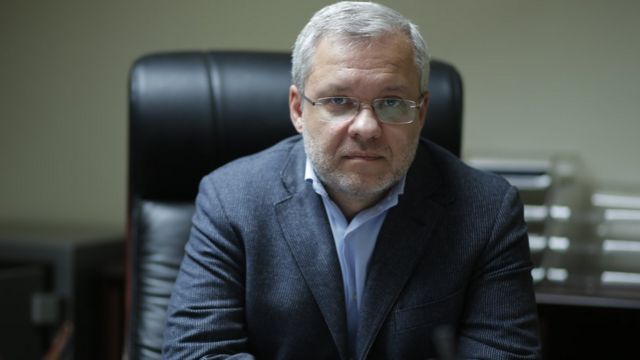
Энергетический замглавы офиса президента Ростислав Шурма публично уже открестился от этой сделки Галущенко. А рынок наполнился слухами о возможных бенефициарах «реприватизации» облэнерго.
Частные миноритарии, захватившие власть в наблюдательных советах государственных облэнерго, — в основном работники самих облэнерго, владеющие незначительным количеством акций на уровне 0,00001%. Это, скорее всего, те акции, которые в 90-х годах прошлого века раздавали людям во время ваучерной приватизации. Но эти миноритарии делегировали непростых кандидатов.
Так, рядовой инженер «Тернопольоблэнерго» предложила в состав наблюдательного совета своей компании людей, которые ранее представляли других акционеров в облэнерго Николаева и Черкасс. Корпоративный секретарь «Черкассыоблэнерго» номинировал в НС представителя «Энергоатома». Клерк «Хмельницкоблэнерго» предложил избрать в НС своего предприятия двух членов набсовета «Харьковоблэнерго».
В чем смысл? Теперь новоизбранные набсоветы имеют полное право назначать председателей правлений облэнерго, которые уже и распоряжаются оперативной деятельностью естественных монополистов. Именно от них зависит, с какими частными структурами будет работать облэнерго по подключениям клиентов и кому будет заказывать ремонты линий электропередачи на десятки и сотни миллионов гривен (вот пример, как государственное облэнерго бьет рекорды частных облэнерго).
Это самые большие денежные потоки облэнерго, через которые владельцы компаний обычно и выводят средства. Тот игрок рынка, который хочет получить под контроль потоки того или иного облэнерго, должен правильно найти центр принятия решений, в котором и получить разрешение на назначение желаемого председателя правления. То есть пройти так называемый процесс обилечивания в центральной кассе.
Сейчас государственными облэнерго управляет незримая сеть рядовых работников-миноритариев. Именно они должны давать указания своим членам наблюдательных советов, как голосовать за назначение председателей правления. Однако из-за их подчиненного статуса наемных работников на зарплате создается впечатление, что они выполняют внешние указания.
Учитывая назначенный миноритариями состав НС есть основания полагать, что центр принятия решений, вероятно, находится в Министерстве энергетики под руководством Германа Галущенко. Немало предложенных миноритариями кандидатур представляют «Энергоатом», из которого Галущенко и пришел в министерство. Среди них и бывший первый заместитель председателя Фонда госимущества Украины Дмитрий Парфененко, который сейчас является советником руководителя «Энергоатома» Петра Котина из команды Галущенко.
Конечно, за два месяца после избрания наблюдательных советов рынок наполнился слухами о желающих получить то или иное облэнерго. Сейчас не вызывает сомнений только судьба «Харьковоблэнерго». Его относят к сфере влияния непосредственно заместителя главы офиса президента Олега Татарова, поэтому ни о каких изменениях потоков речь не идет. «Тернопольоблэнерго» может быть интересным группе Суркисов, «Николаев-» и «Запорожьеоблэнерго» — возможно окружению Давида Арахамии. Однако отметим, что это лишь слухи о возможном интересе определенных людей, которые сами на себя могут перебирать чужой статус.
А вот то, что слухами не является. Идеологом передачи шести государственных облэнерго в управление УРМ был замглавы офиса президента Ростислав Шурма. Однако на днях его советник заявил «Форбсу», что Шурма не имеет отношения к тому, что делает сейчас министерство Галущенко.
Первым этот процесс 2023 года заметил известный эксперт энергорынка Александр Визир. Во времена Порошенко-Кононенко он работал в Фонде госимущества и Киевском горсовете. В 2021 году появилась информация, что президент Владимир Зеленский поручил управление государственными облэнерго «Энергоатому».
На тот момент Александр Визир был помощником главы «Энергоатома» и советником министра энергетики. Однако впоследствии Галущенко изменил все процессы и уволил осенью 2022-го уже ненужного советника. Следовательно, Визир пошел на вольные хлеба и с декабря 2022 года работает в ОО «Ассоциация энергоэффективности и энергосбережения», а с апреля по декабрь 2023-го — в «Черкассыоблэнерго». По его словам, он занимался закрытием производства по делу о банкротстве «Черкассыоблэнерго» (банкротство закрыли).
Александр Визир ударил тревогу по «теневой приватизации» облэнерго в декабре 2023 года, обнародовав у себя в Фейсбуке информацию о назначении в наблюдательные советы. И получил за это уголовное дело. За что? Потому что устроился на работу, получил зарплату и потратил ее по своему усмотрению (см. скан).
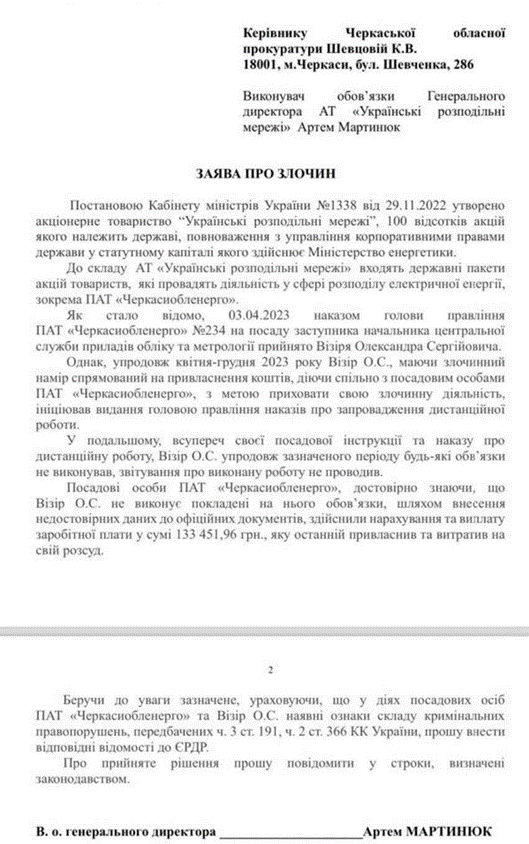
Прямая речь обличителя:
«После публикации мной поста в ФБ мне сразу начали передавать «приветы» через знакомых в отрасли. Перед Новым годом меня даже набрал руководитель АО «УРМ» Артем Мартынюк и сказал, что его заставляют в Минэнерго написать в отношении меня заявление в прокуратуру, и предложил как-то помириться с министром. Я сказал, что это в принципе невозможно, потому что я с ним не ссорился, а лишь осветил объективную реальность
По факту этого заявления 01.01.2024 было открыто уголовное производство (пока что фактовое), хотя на тот момент я уже уволился из ПАО «Черкассыоблэнерго».
Минэнерго в первых числах 2024 года начало разгонять новость о том факте, что я уклонист, и что по факту этого проводятся проверки и возбуждено уголовное дело. Как можно увидеть из текста заявления о совершении преступления, оно не касается «уклонизма», а касается якобы моей «ненадлежащей» работы.
27.02.2024 меня уже вызвали на допрос по этому делу. Я не верю в его перспективность, как минимум потому, что все необходимые рабочие задачи я выполнил, а полученные средства перечислил на нужды ВСУ и все это было сделано до соответствующего заявления АО «УРМ». На мой взгляд, основная задача этих «мероприятий» — запугать меня. Из-за моей позиции о необходимости смены менеджмента АО «Харьковоблэнерго» из-за ужасных результатов финансовой деятельности этого предприятия (сейчас находится под контролем Олега Татарова) следователи ГБР 16.08.2022 года провели у меня в квартире обыск (причем постановление об обыске было выдано Лычаковским районным судом города Львова, а живу и зарегистрирован я в Вышгороде), изъяли компьютерную технику, телефон, документы и денежные средства. После этого ГБР ни разу меня не вызывало и не проводило в отношении меня никаких действий.
09.05.2023 года я отменил арест, наложенный на мое имущество, но 15.06.2023 ГБР через Печерский районный суд города Киева повторно наложило на мое имущество арест.
06.03.2024 года я повторно отменил арест и обратился в ГБР по возврату моего имущества. В январе 2024 года я также подал заявление в Европейский суд по правам человека о нарушении моих прав по распоряжению принадлежащим мне имуществом».
Итак, выводы таковы.
Группа Германа Галущенко в сотрудничестве с правоохранительной вертикалью Олега Татарова проводит очередную операцию по перераспределению энергетического рынка. В прошлом году они уже пытались подвинуть государственное «Укрэнерго» с потоков международной финансовой помощи. А сейчас устроили не очень элегантную приватизацию государственных облэнерго.
По реакции Владимира Зеленского мы поймем, было ли это «партизанской вылазкой», которых в ОП не терпят ни под каким соусом, или же согласованной операцией.
Также эта история в очередной раз доказывает недейственность лучших из лучших западных практик в наших широтах. Без действенного и неотвратимого наказания коррумпантов все эти проверенные годами западные рецепты здесь легко трансформируются в схемы.
Важно отметить, что 5 марта 2024 года президент подписал проект Закона Украины «О внесении изменений в некоторые законодательные акты Украины относительно усовершенствования корпоративного управления юридических лиц, акционером (учредителем, участником) которых является государство» №5593-д, который разблокировал получение Украиной 1,5 млрд евро макрофинансовой помощи от Всемирного банка. Нормами этого закона как раз и является усиление корпоративного управления в госкомпаниях и расширение полномочий набсоветов. Не очень коррелирует с тем, что на самом деле государство допускает наличие в госкомпаниях набсоветов, которые
Ниже для любознательных читателей мы публикуем списки членов набсоветов, избранных подозрительным образом в конце 2023 года, и миноритариев, которые выдвигали этих членов в состав набсоветов.
Наблюдательный совет «Тернопольоблэнерго» захватили представители Григоришина и рядовой работницы из облэнерго
Государственный акционер «Украинские распределительные сети» получил одного из семи членов НС, имея 51% акций. Офшор Bikontia enterprises limited из группы Григоришина при 25% акций получил трех членов. И также трех членов получила инженер этого облэнерго Галина Наумик, которая владеет 0,000001% акций. За такое решение проголосовал мажоритарный акционер — государственное АО «УРМ»
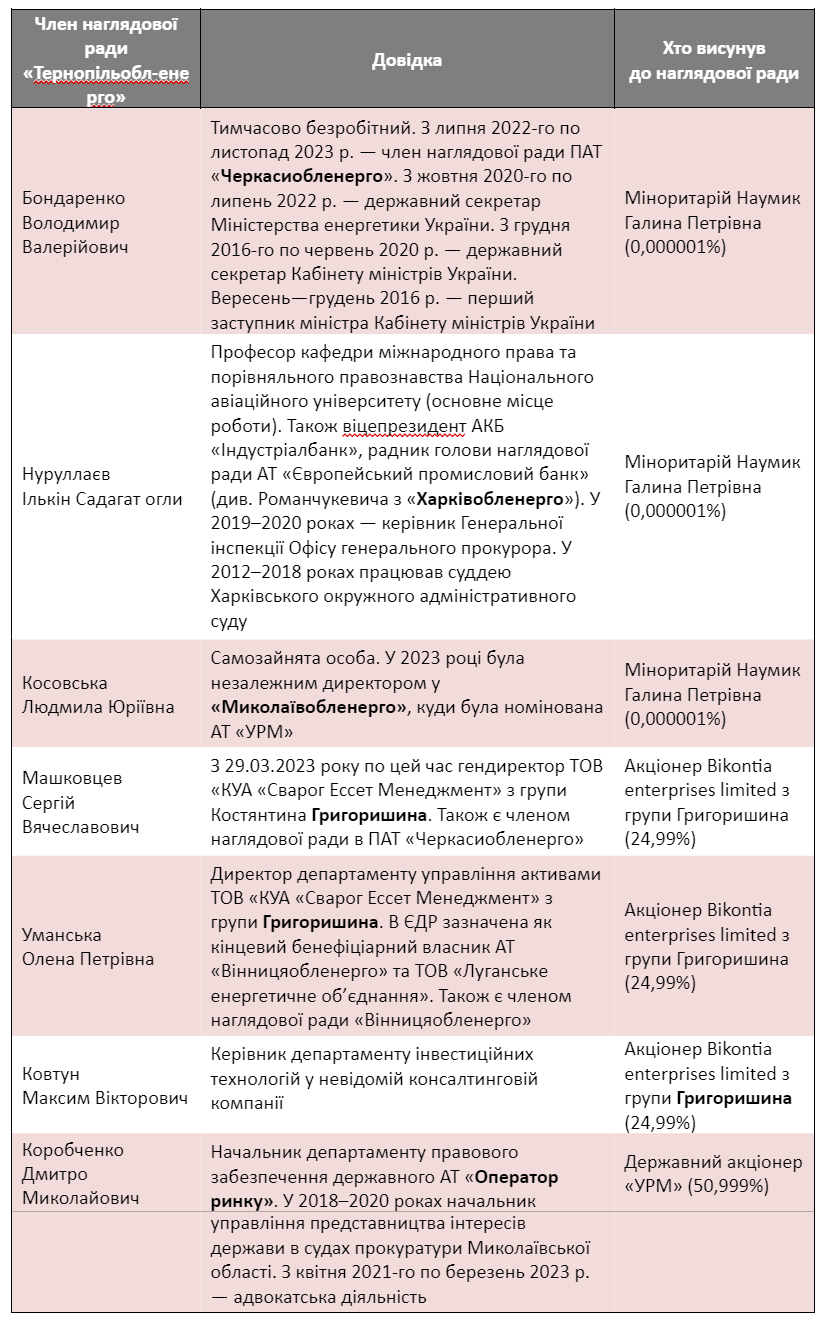
Наблюдательный совет «Черкассыоблэнерго» захватил миноритарий Горстка
Четырех из семи членов НС получил владелец 0,00006% акций Василий Горстка, также известный как корпоративный секретарь «Черкассыоблэнерго». Еще двух членов получила группа Григоришина с 24% акций. И только одного можно назвать представителем государства, которое в целом контролирует 71% акций облэнерго. Однако привлекает к себе внимание то, что фактически все предложенные Горсткой члены так или иначе связаны с государственным сектором.
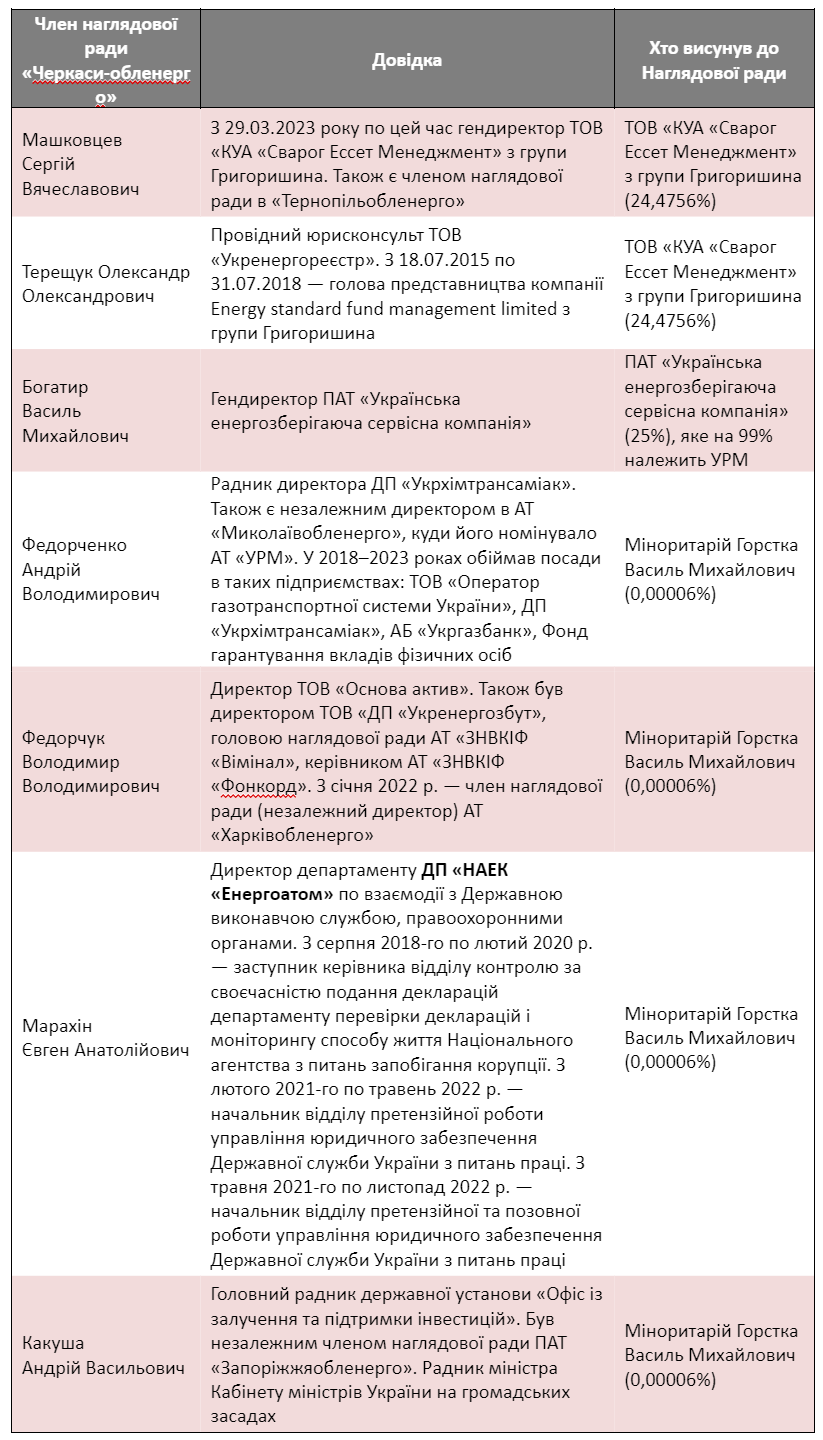
Наблюдательный совет «Харьковоблэнерго» захватили юристы-миноритарии с 0,0000…%
Из семи членов НС только трое представляют УРМ с 65% акций. Остальные выдвинуты миноритариями, имеющими лишь несколько акций облэнерго. Трое — от Ярослава Нечипоренко (ФИО совпадает с данными владельца юркомпании «Юридическая помощь», Киев) и один — от Анны Квицинской (адвокат с таким ФИО представляет «Харьковоблэнерго» в судах).
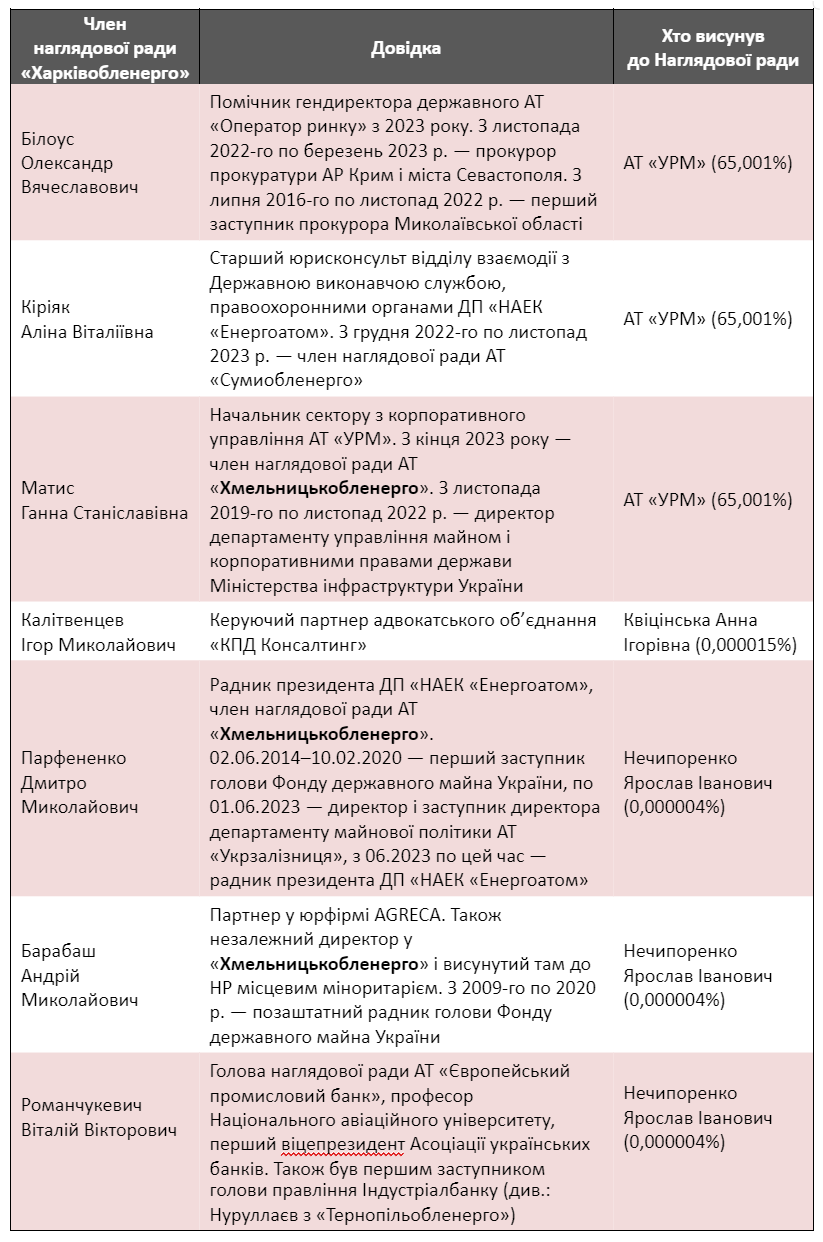
Наблюдательный совет «Запорожьеоблэнерго» захватил начальник службы охраны труда
Четыре из семи кресел в НС получил начальник службы охраны труда «Запорожьеоблэнерго» Василий Федорончак с 0,001% акций. Еще двух получили оффшоры частных акционеров. За такой расклад проголосовало государственное АО «УРМ» с 60% акций, которое получило лишь одного представителя.
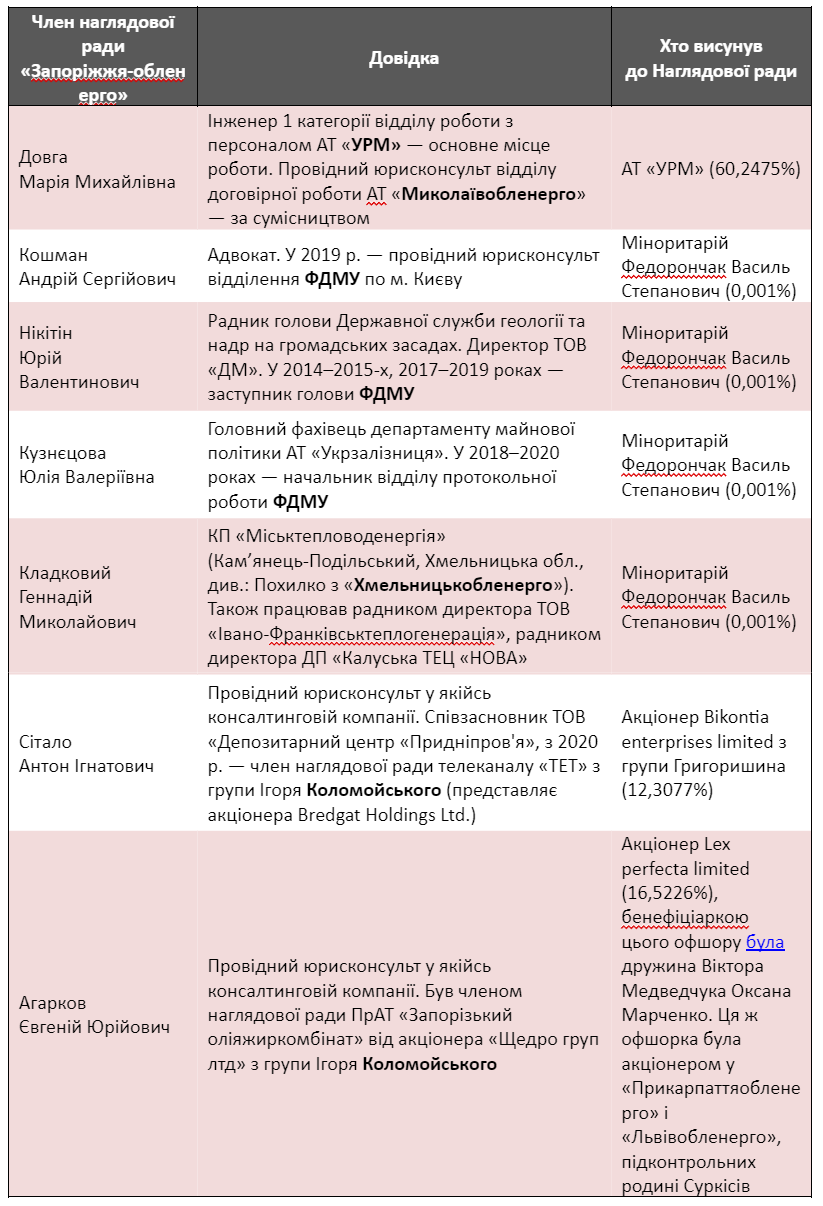
Наблюдательный совет «Хмельницкоблэнерго» захватил клерк самого облэнерго с 0,00026% акций
Четырех из семи членов НС предложил заслуженный энергетик СНГ Борис Кравец с 0,00026% акций, который работает в аппарате облэнерго. Еще одним членом стал миноритарий Евгений Ситниченко с 0,2355% акций, который выдвинул сам себя. И с таким раскладом согласилось государственное АО «УРМ», которое на свои 70% акций получило лишь двух представителей.
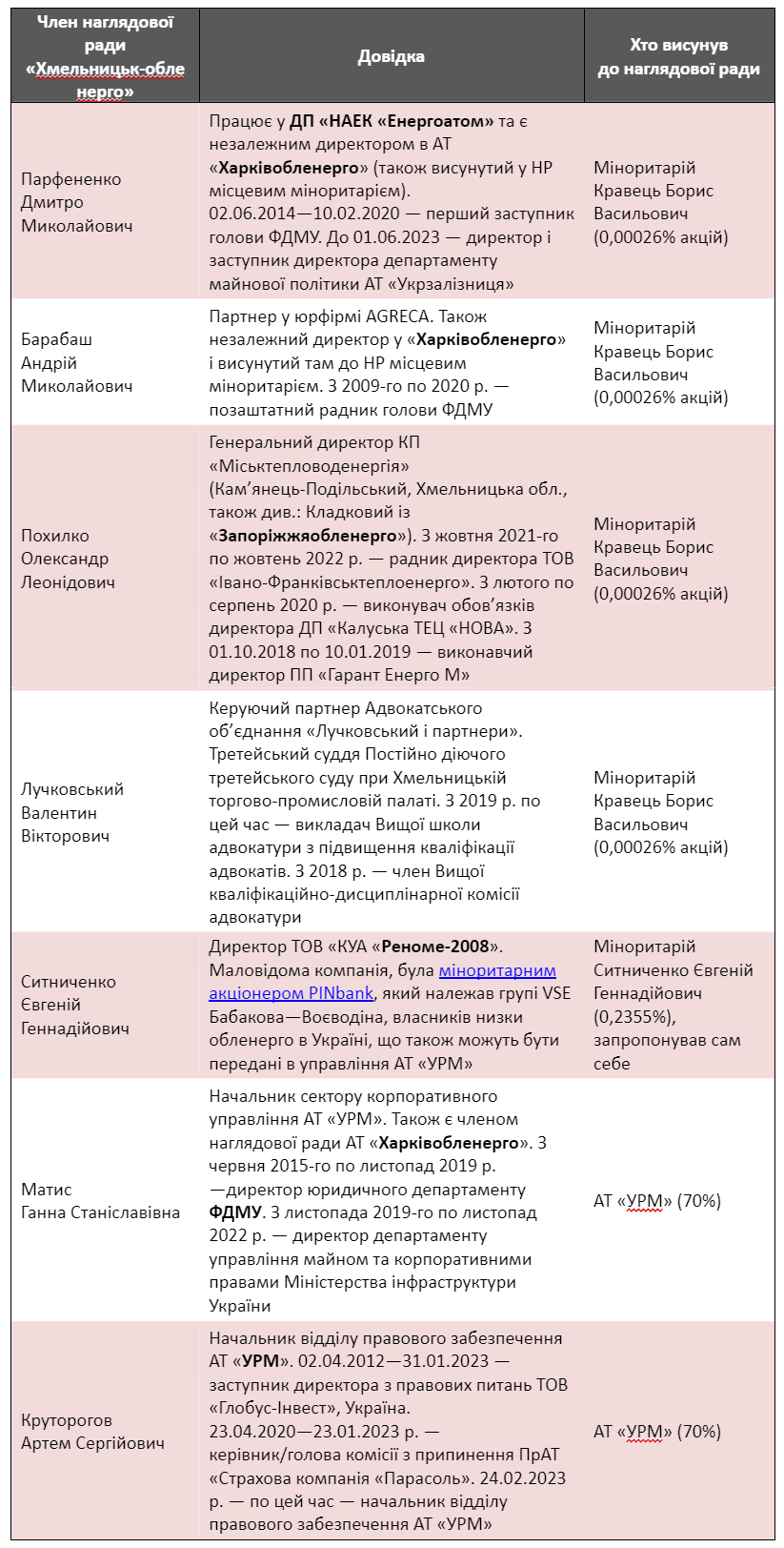
Наблюдательный совет «Николаевоблэнерго» получило государство
На фоне остальных облэнерго отличилось николаевское. Здесь пять из семи членов представляют государственное АО «УРМ». Еще двое — это представители миноритарного владельца КУА «Реноме-2008», который ранее был связан с российскими экс-акционерами украинских облэнерго VSE Бабакова-Воеводина-Гинера.



